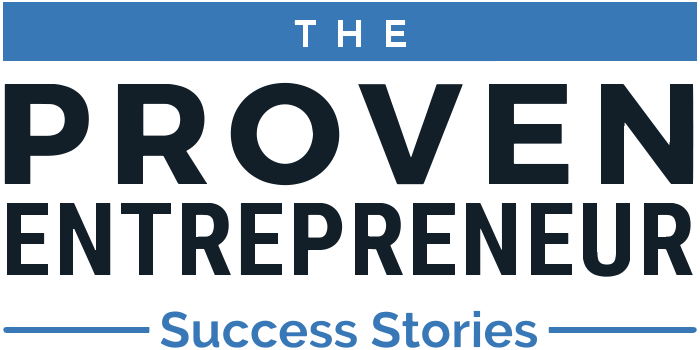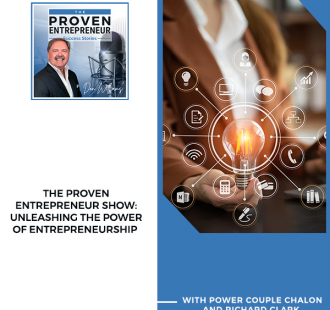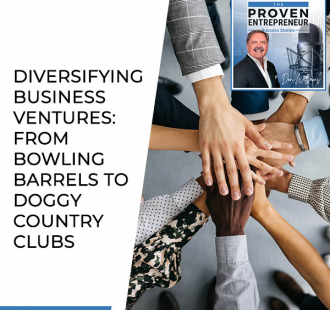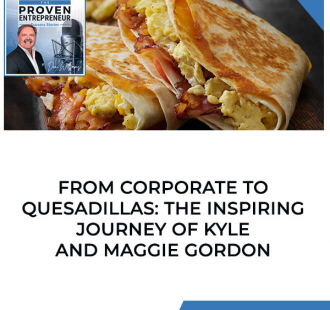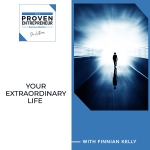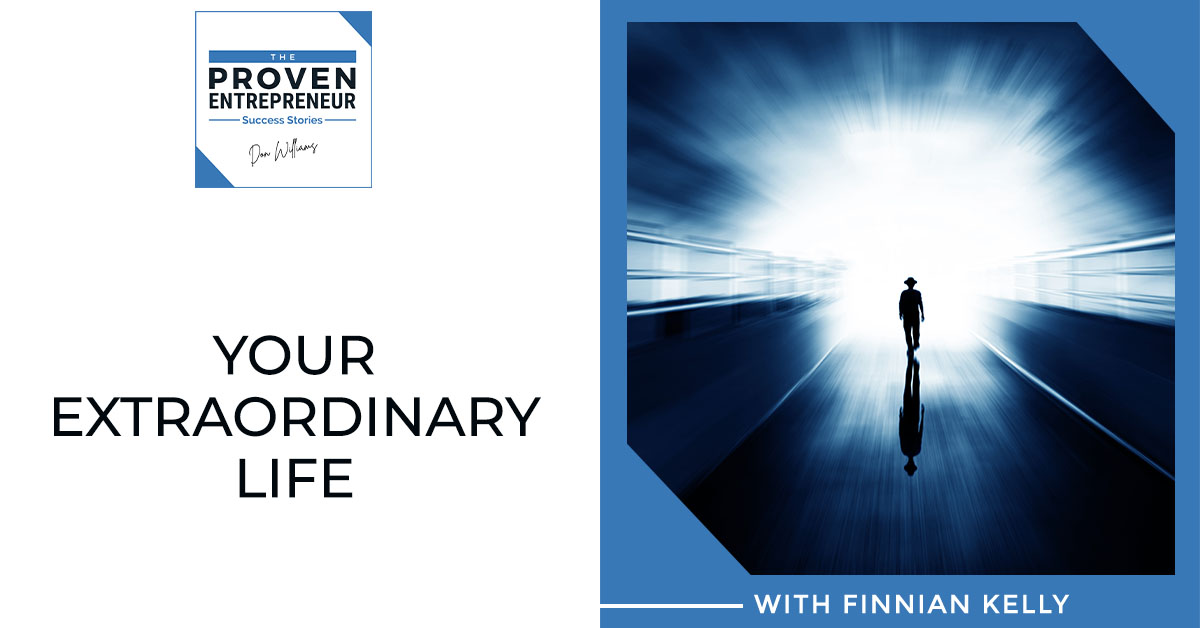
Ever felt that something is missing when everything is within your reach? If you are looking to fill that void, don’t miss this episode of The Proven Entrepreneur! Listen and be inspired by Finnian Kelly, the Founder of Intentionality, as he shares his story of self-doubt and reflection. Finnian tackles how he found clarity of purpose, focus, and his way back to entrepreneurship through living life with intentionality.
For information on how to work with Don visit Work With Don Williams
You can also reach out to Don Williams at https://donwilliamsglobal.com
Please join Don and his businesses in support of St. Jude’s Children Research Hospital in its Mission to cure Childhood Cancers. You can donate to St. Jude at stjude.org/donate
—
Watch the episode here
Listen to the podcast here
Your Extraordinary Life With Finnian Kelly
Living With Intention
I have a very good friend all the way from Aspen, Colorado. He came off the slopes to join the show. He’s the Founder of Intentionality. He’s known as the Business Mystic. Please welcome to the show, Finnian Kelly. Finnian, how are you?
Don, I’m in a state of gratitude, which I know you appreciate a lot because I had an incredible snow powder day. That fills my cup more than anything else. I’m excited about this.
I love downhill skiing. It’s one of my absolute favorite things to do. I got started years ago. I used to tell people, “It’s about the only place on the planet I don’t worry about my accounts receivable or accounts payable.” If I’m skiing at the edge of my ability where I have to pay attention to what I’m doing, I can’t be letting my mind run back to business. Tell us, what is Intentionality.com? What do you do? You’ve had a couple of careers already in your life. What are you doing now?
What I’m doing is staying in my lane, which is nice. I have had a variety of backgrounds. I was an Army officer, financial expert, and entrepreneur. I built and sold a number of companies. I’m embracing this one word, intentionality. It’s so nice to be known for one word because now I’m not split in playing different roles. It’s whatever I show up, whether I’m speaking, coaching, investing in companies, skiing, or partying. It’s all around intentionality. For me, intentionality is defining how you want to feel and then taking deliberate action towards it. It’s that combination of vision and action.
For us, it’s about providing a pathway for people to live an extraordinary life because I do believe that everyone has the opportunity and the capability to live an extraordinary life. They need to get clear on what matters to them, and then be willing to take the courage to take the steps to get there. We’re doing that through digital programs, speaking, forum retreats, and big events. It’s a lot of fun. I love it more than I’ve ever loved anything I’ve done before.
I’ve done three forum retreats in a month. I love the intentionality coupled with the vision for where you want to go. Our good friend, Warren Rustand, would add your core values along with that. Those are the three legs of his platform. I am a firm believer that you are in your zone of genius but not things that you do excellently, things that you’re competent at, and things that you’re incompetent at but truly where your genius shows and where you can be magnificent. Typically, when you use that word with people, they’re like, “That’s a little heavy. I don’t know if I’m magnificent at anything.” I’m like, “I assure you. You are. You know what it is. You’re deflecting.” Rather than deflect, let’s full-tilt boogie, embrace, and let it shine.
That was a big lesson for me because I have been good at a lot of things. I was exceptional at being a financial expert, money manager, and speaker in different areas. The one thing that I did naturally was to live with intentionality. I looked back at all my customer testimonials. I worked with a lot of EOs and YPOs. Everyone in your audience knows that. They’re incredible entrepreneur groups.
There was this consistent theme. They were like, “Finn is the intentionality guy. He lives with more intentionality than anyone else.” I kept seeing that and I was like, “This is what I do without even trying.” I am magnificent in that. I claim that word. I enjoy experiencing that. I get to go deeper into it. I play with it and go, “People are giving me permission to be me. How do I bring myself out even more?” I’ve got some great people around me who remind me, “Don’t try to be this. This is your area.”
Everyone has the opportunity and the capability to live an extraordinary life. They just need to get clear on what matters to them and then be willing to take the courage and take steps to get there. Click To TweetI too, am a person who can embrace my genius and magnificence. The part that I have to avoid and put the earmuffs on where I don’t hear the call of the siren is my area of excellence because my highway of excellence is pretty wide. There are a lot of things I do better than most people. It’s certainly comfortable to live in your zone of excellence because you’re good at it. Your zone of magnificence many times involves some discomfort. You’re out of your comfort zone because that’s where the good stuff is. I’m going to take you all the way back to young Finnian from ages 5 to 18. You were born and raised not in Colorado.
I was born in Sydney, Australia but then brought up in Tasmania. I’m a little Tazzy devil. When I was one, we moved to a country town for the first seven years and then moved to a big farm. We lived on a farm there for a long time. I wasn’t little Finnian. What’s interesting is my name is Finnian but forever, I was Finn. In my whole childhood, I never used Finnian once. I’ve only come into that name in the last few years. It was my transition. I was like, “It’s time to use my real name.”
I’m a farm boy. I loved sports and adventuring. I also had some challenging relationships with my parents, which have been quite a defining part of my life. It was what led me to your title, Success Stories. It led me to all my success. I’m very high-driven. I wanted to prove to the world that I was lovable and worthy. That created a lot of success. I was under 30. I was the Entrepreneur of the Year three times in Australia. I had the fastest-growing company and exits.
It was great but then what often happens is what got you successful is what also will make you unsuccessful. Eventually, the fear mentality, the unworthiness, and the fear of being abandoned ended up me having that transition later in my life. It’s funny. What we recognize as success often changes as we grow older or have more experience.
We’re all in a constant state of growth or decline. Things may not change but certainly, our perspective on those things changes. The non-entrepreneurial public thinks that entrepreneurs become entrepreneurs out of a profit motive. They want to make money. I won’t dispute that there’s something to that but so many times, there’s not. I have huge authority issues and I couldn’t take somebody telling me what to do anymore, or I had people who didn’t believe in me but I was motivated, “I will prove them.” Those types of motivations are far more common than the profit motive.
The most common motive is, “I’m not worthy and lovable.” We’re trying to prove ourselves to the world. It’s interesting. We worship a lot of entrepreneurs like they’re rock stars. If you look at them, they’re often hurting inside. Potentially, they need to stop focusing on changing the world and focus on changing and healing themselves. It can be a distraction. It can often have a great byproduct. We help a lot of people but at the same time, it can stop us from helping ourselves, which is the most important.
I think of Steve Jobs. He was a phenomenal entrepreneur and leader but he would not recognize his biological daughter for twenty-plus years even though he probably named the computer after her. He recognized her internally but refused to recognize her externally. I have my feet of clay. I’m not throwing rocks at Steve but that happens. I’m going to take you back to young Finn. We’re still at 5 to 18 in the household where you grew up. People live in different kinds of households. Whether it was with your folks or grandparents, was there an entrepreneur in the house? Did you have someone who set an entrepreneurial example as a young child?
I had never seen them as entrepreneurs but we have yet to look at the definition of entrepreneurs they were. My mom was a doctor. She’s a general practitioner. She set up her little business. My dad has supported her in that. My dad was a musician. He was on the rise and becoming very successful. When I was born, he struggled with both worlds. It didn’t work that well. I suppose he bought a farm and tried being an entrepreneur there.

He was one of the first Macintosh Apple distributors in Australia as well. He had a music store. What I learned from him was he had a lot of starts but never got anything nailed and didn’t stay in his lane. It was the idea that you were able to create your pathway and income, not rely on anyone else, and not have a boss. I never saw my parents have a boss. That’s something. I realize now that they were entrepreneurs.
Mom was a high-functioning solopreneur as a physician. I look at my personal physician. He does very well but when I talked to him, he was like, “It’s a job. If something happens to me, it’s over.” I’m like, “That’s why entrepreneurs diversify when that doesn’t happen.” It sounds like dad was a solopreneur and an entrepreneur. Many entrepreneurs chase what is shiny. They’re big on starts. I’m not throwing a rock at them either. At finishes, that’s common, as we know in the entrepreneur world.
The title of the show is The Proven Entrepreneur: Success Stories, but you and I both know that all success stories have a failing or 2 or 4 somewhere as a chapter or multiple chapters in the book. The interesting thing after having done about 100 of these interviews with some great entrepreneurs is it almost appears that the deeper the failing and the valley, the higher the success, the win, and the peak. There are little failures, little wins, huge failures, and huge wins as long as you don’t quit. Keep going.
The big element is that there are a lot of people who struggle to know what they want. Sometimes you need to find out what you don’t want to get clear on what they want. When you have that big failure and you see the damage it does to your health or relationships, you suddenly realize, “I’m never going to do that again.” You make that commitment to yourself. There are certain things through my failures or lessons. I’ve gone, “I’ll never do that to myself again.” That was too much pain.
As long as it doesn’t stop you from taking risks and having the courage to be bold, it can help you. Sometimes losing money is valuable because then you realize, “I didn’t need as much as what I thought because if I had what I had, I would be pretty happy.” That’s a great lesson in itself as well because you can always have more. Once you start that train of wanting more, there’s never enough. You’re continuously on it.
Many times, the entrepreneur who has had a financial reversal learns, “Maybe I should place more value than I did.” If it gets too easy, we’re only keeping score with it. I’m a firm believer that money in and of itself has no value. It’s only the products, services, and experiences you can trade them for. Those have value but coins and paper don’t have any value other than what we project onto them. Otherwise, they’re worthless.
I’m still back with young Finn. It’s not mowing the yard because mom and dad said you had to. What was your first job? Maybe your first job was a lemonade stand and you were an entrepreneur. What was the first endeavor that you did where you earned money and were compensated? How old were you? Tell us about that.
One of the great things about being on a farm is there are a lot of resources there. If you’re creative, there are ways to set up a little business. There were two resources that I found valuable. One was these big pinecone trees. They would dump a lot of pinecones. Tasmania has a very wet countryside. The wood in Colorado is so dry. Every time I light a fire, I get a little rush in Colorado because it’s so easy and amazing. In Tasmania, it’s wet wood. It’s damp. Often lighting fires is quite hard but pinecones are these incredibly dry things.
What often happens is what got you successful will also make you unsuccessful. Click To TweetPeople don’t often use them for lighting fires but if you put a couple of pinecones in a fire, they will blow up. I started seeing that a lot of people wanted to start having a firelighter a lot easier. I would sell bags of pinecones. I had unlimited resources. I had a bunch of trees. I would go in there and I started learning about the different sizes. I would have little plastic shopping bags and then big fertilizer bags as well, which were a lot bigger. I worked out the price differences. I could see, “If I sold some of these, I would make more money and have a high margin.” That was a great experience.
Another one at the same time was sheep manure. We had a shearing shed. Sheep manure is incredible fertilizer. I would get it underneath the shearing shed. Shoveling shit was my first role. I’ve shoved a lot of shit in the rest of my life as well. That entrepreneurial journey was there. If I would get into a good flow, I could sell those bags for $5 each. I could do about twenty in an hour if I was humming. Sometimes I’ll get friends, give them a clip of the money as well, and then be able to sell them.
That did start my financial independence from about eight plus. I started working at 8 but about at 10, I used that money to be able to do the things I wanted to do like go play tennis tournaments, buy new tennis rackets, Nintendos, and whatever I wanted. I would use it in that way. For me, it was all about exactly what you shared. It wasn’t about making money. It was about what I could do to get the things I wanted. I worked out, “Here’s a way and a solution. I want these things. Here’s a way to do it.”
Back then, you mowed the grass because your parents told you to. There were consequences if you didn’t. You didn’t get paid for doing that. My grandparents were wheat farmers. I drove a big green John Deere tractor pulling a disc behind the combines as they would go through the field and harvest the wheat. It’s a filthy and nasty job. There’s so much dust and debris in the air. It’s 105 degrees and the sun is pounding down. It is not for the faint of heart.
Whoever is disking is about 15 or 20 minutes behind them but it’s still a cloud of stuff. I was eleven. People that are raised on a farm find out that you start shoveling at 8 and drive the tractor at 11. I drove the truck nine miles from the house to the farm before I got on the tractor. You couldn’t do that now in the States but back then, nobody thought anything of it. It’s like, “We got a job to do. You’re healthy. Go do it.”
Another big one was wood chopping for me. I remember going out there with a truck by myself with a chainsaw in the middle of nowhere with no phone and communication. Things would go wrong all the time. It is quite amazing how we lived back then. I’m younger than you but we have changed a lot.
I have a good friend, Trent Clark. He was a three-time Major League Baseball World Series coach. He’s a super guy. He does a lot of work with high school-age young men. One of his key points to parents is, “Quit doing so much. Let the boy who’s going to be a man do it. Will they make mistakes? Yeah. Will they do stupid stuff? Yeah. It’s how all of us learn.” We learn more from those mistakes far more from those mistakes than we do from the others. We’re leaving young Finn in Tasmania. From 17 to 18, you joined the military, went to university, and did both. What’s your story?
I did both. From where I was in Tasmania, it was interesting. Even though I had that little entrepreneurial experience, it was very small-minded. It was like, “If you got good grades, you’re going to be a doctor, lawyer, or accountant.” My best friends were all going to be doctors. Their parents were doctors. My mom was a doctor. Grandma and grandfather were. There was this pressure. I got into medicine but I knew internally that it was never for me.

I didn’t like the egos that were around medicine. I wanted something different but I didn’t know about investment banking. That was what I was most suited to at the time. I didn’t have much awareness and didn’t know about any of these other options. Someone came to our school who left the school and became a helicopter pilot in the military. I was like, “That could be cooler than being a doctor.”
Back then, unfortunately, my ego was, “How do I justify the story of why I’m not going to be a doctor?” The helicopter pilot worked. They also said that they would pay for my university. I had lots of different experiences. It played on my adventurous spirit. I thought it was going to be a big sporting club and have a lot of fun. At seventeen, I was the youngest Army officer in Australia. I did a Math and Physics degree also while becoming an Army officer.
You do four years of military training at the same time as university. I was not guaranteed to be a pilot. That was interesting. You have to go through this process and then a selection process. Thousands of people applied. Eventually, I got accepted into the pilots’ course. That was my first experience of true passion. It wasn’t from me. It was observing everyone else. It was the other people there. They loved it. Most of them wanted to be a pilot since they were two years old.
They lived to breathe. They will get off the flight. They were buzzing. On a Saturday night, I would be going out in the town to party and play remote control planes. I would come back and they’re still there. It was interesting. I felt out of place. Every day people were getting dropped. I felt guilty that there I was taking the place of someone else. I made a commitment to myself, “I can’t do this for ego’s sake or status. I have to find things that I enjoy.”
That transitioned me out of pilot training. I became a medical logistics officer in the military because I had to owe a certain amount of time. I started trading currency and equities to see if I could financially support myself because I was like, “How do I get out of the military?” I felt a bit trapped. I started doing it and found a pathway out. That transitioned me into my first entrepreneurial business, where I set up a private wealth management company at 24.
I have a good friend. He retired as Colonel in the Air Force. He was one of the two pilots that were the test pilot for the stealth when it first came out. Back then, nobody knew about it. He accepted that job with the job undefined. The Air Force said, “We think you will like it. You tell us if you’re in or out.” People who are not familiar with the process don’t understand that a lot of people want to go be pilots and most of them don’t make it.
The ones who do, want to be fighter pilots or Black Hawk helicopter pilots. Most of them fly planes that carry freight. It’s only the best of the best that make it to that level. If they have a little more best, here in the US, they become astronauts. It’s a pretty elite group. That’s how you started your first business. You’ve had a couple of exits. Tell us about how you started the current business.
The current one, Intentionality, has been formed. I had been doing this Intentionality work. On the side, I would coach people in YPO and EO, speak at different events, and facilitate forum retreats. A pretty defining moment in EO for me was when I was President of the Colorado Chapter. After our first Strategy Summit, where we spent two days doing leadership work and planning everything for the year, in the end, I had this remarkable moment. We went around. I was holding everyone accountable.
Making decisions out of fear will never lead to peace and joy. Click To Tweet“After everything that has come out, are you going to be able to honor this? Can I hold you accountable?” It was this agreement between us. Everyone said yes. They were excited and jazzed up. I realized I didn’t have a single task. There wasn’t a single task for me. It was a good strategy day. I looked around and I was like, “What’s happening here? These people are the most incredible.” I pick the best entrepreneurs. They are all great leaders. They all had a lot of success. Here I was holding them accountable.
They’re excited. I wasn’t paying them. They didn’t have to do anything. I went back to the company I had at the time and realized I wasn’t doing that and surrounding myself with these A-players. That was the big moment where I went, “Everywhere in my life, I surround myself with A-players like my mentors, coaches, friends, and people on my boards.” In my company, I had some but I had consistently not had A-players. I was like, “I refuse to do this from now on.”
That sent me on the path of selling that company. I went, “From now on, I want to be in an arena where I’m not the smartest person in the room. I’m an asset but I appear much like I’m an asset for other people.” I lead through doing and being the best I can be in my world. That’s what started Intentionality. I was like, “I’ve got to be intentional with how I want to experience business from now on.” I’m happy with it. The people I’m working with are the best. I’m super excited about it. It was more of, “I need to spread this message to other people. It’s time to go all-in.”
It took me a long time to refine what my mission was. My mission is to help others. It was a journey and a path to get there. Thinking back across your varied mini careers, I’m looking for a hard lesson and something that, when it occurred, was like, “I can’t believe this is happening.” In retrospect, maybe that hard lesson was for the best but it was hard to see at the moment. Do you have a hard lesson you can share with us?
I have a few. The people are a huge one for me. It’s realizing that all businesses are people and getting the right people. As an entrepreneurial business, we believe we can look at potential too much. I don’t believe you can as an entrepreneurial business. I believe you need to get people who can add value now. In a year’s time, if you can coach them up to get to the next place, that’s great but it’s about adding value now. I’ve trained a lot of people in life and then they have gone off and been valuable elsewhere. That has been a huge one.
Another one is about legal issues. We got into a legal battle over a company we sold a number of years ago. There were unethical people who never wanted to pay us a considerable amount of that money. At that moment, I wish we had cut our losses and realized that we had been played. There’s a lesson in that. There’s the due diligence process. We didn’t do enough due diligence on the sellers. You often think about buying the business’ due diligence but you need to do due diligence on who you’re selling to because that’s where most of the value goes.
What we did to ourselves in those following years was horrible. It killed other businesses. We made bad decisions in making money and health-wise. My relationship completely broke down with my partner. I realized the cost of that was so much more than the money. Unfortunately, legal stuff happens in business sometimes and you have to go, “That was unlucky. Let’s move forward.” That has been my biggest one. I’ve seen it with so many legal battles with entrepreneurs.
They always think it’s going to be worthwhile but I’ve never seen one, which is worthwhile. Either go super hard and clinical, outsource it from the first second, go all-in and you’re willing to back yourself with financial things, but you’re going to distance yourself from it, cut it, or move on. Be smarter next time with who you work with, whether it’s a customer, partner, or sale price, because there’s a higher cost that isn’t financially there. You can’t see it. That’s a problem. Even the people who win go, “I won this.” I’m like, “You didn’t. There was so much more that you could have lost.”

I’ve got a good entrepreneur friend. They were involved in legal action for about five years. He said, “We won in theory. In the court, we won but if you deduct our actual expenses, we got about enough for a two-liter bottle of Pepsi and a pizza because we spent all that. We had five years of hell, mental and emotional turmoil, and stress.” I once bought a property where the seller had second thoughts.
They didn’t want to convey the property but I wanted them to convey the property. We had a contract. I sought counsel. A good friend said, “You sue over this.” I was like, “I don’t know if I want to get involved in that.” There’s fun to the story. We did. It took a couple of years and cost more than a few coins. We prevailed because we had a contract where the seller had agreed to sell the property. We had agreed to buy the property. It was all written up.
I purchased the friend who had given me the counsel a nice bottle of wine and took it to him as a thank you for the time and expertise he shared with me years ago at the very beginning. It was so funny to me. He said, “I’m so glad that worked out. That’s how you do it but I’ve never seen it work.” I was like, “I’m so glad you didn’t tell me that because then I wouldn’t have done it.” I certainly agree.
What about a warp-speed moment? Things are going along pretty well in your business but all of a sudden, you make a change, implement a strategy, or get a new hire. You’re that hockey stick of growth. It’s warp speed. It’s like, “We have been working our tails off for this long to get here. All of a sudden, it took off.” Do you have a warp-speed moment you can share with us?
I don’t think I do. I wish I had. What I have seen is the power of staying in your lane and doing lots of little activities. It suddenly feels like momentum is built. It’s the quantum leap. When you think of a quantum particle taking a leap, there’s all this energy vibrating. Suddenly it jumps up to the next thing. I’m experiencing that. It’s the consistency of being consistent with your message, communicating it, and not going off onto shining objects. Suddenly things are like, “A lot of amazing opportunities are coming in.” I can’t put it to one thing but I know it has been this consistency, which has been important.
To tell you the truth, a lot of the time in life, I was looking for that warp-speed moment. Perhaps that stopped me from doing the consistency, which would have ended up giving me that warp-speed moment. Let me see in a year’s time if I can report to you and go, “Directly, I saw this happen.” I’m about to finish my book. I do believe that could be one thing, which could make it a standout moment. A lot of that comes down to positioning yourself and then luck has to come into play. I don’t think I’ve positioned myself enough in the past to be vulnerable.
I appreciate that. I want to encourage you to get that book finished. I wrote my first book years ago and published my fourth. I don’t think there’s anything you can do if you are a thought leader as you are to cement, establish, and improve your authority than become a published author. I met with a group of entrepreneurs. I was like, “Notice, the root word of authority is author.”
I’m a big believer that everybody has a story to tell. I’m not a writer. I talk my books and then transcribe my books. They go through a series of editors. I sat down at the keyboard to do my first book. It was brutally painful. I would rather be boiled in oil and my head put on a pole outside the village. I’m not good at that. That’s how I do it. I’m looking for a nugget, a piece of gold, or some wisdom in your brain that we all want to know.
Our greatest asset is our energy. People often think it's time, but it's our energy. Where you share your energy and how to receive energy is the most important lesson we can learn. Click To TweetI would have to pick one of the principles of Intentionality. I believe the one I want to share is, “Escape the prison of comparison by focusing on your path and what steps you can take.” The reason why I say that is when you go on this entrepreneurial journey, it’s so easy to be comparing yourself to everyone else. You’re comparing yourself, “That entrepreneur has a bigger business. They are better than me.” Once you start that journey, you are in prison because there’s always someone you can compare yourself to.
There’s always a variable that you might not have that someone else has. It’s dangerous. What it does is it puts you into a low vibrational state and a place of lack, scarcity, and fear. When you’re in that state, you’re not doing your best work. You then might try to copy or imitate them. It stops you from being clear on what matters to you. That’s why I talk about your path. We each have our path. Paths don’t go in a linear or straight direction. Sometimes they do a big loop around.
Often you might be comparing yourself against someone. You don’t know that they’re about to do a big, U-turn behind you. Do you want to be like them? Before my marriage broke down and I had some business failures, a lot of people were comparing themselves to me so much that when it happened to me, it was confronting because they were like, “We were trying to imitate you. We wanted this life and relationship.” That can be very dangerous. Be mindful.
When you compare, often you’re only comparing yourself against one variable. I say, “If you want that, you then have to have all these other things that person has as well. Do you want these things?” It could be an unhealthy lifestyle, poor financial management, or a bad relationship. They could be unhappy. You’ve got to take it all. You can’t just pick one little thing. I believe that has been the greatest nugget. It stops you from suddenly ending up on someone else’s path and one day waking up and going, “What happened to me? This isn’t the life I want to live.”
That was a true nugget of wisdom. There’s that old story that if you lined up twenty people and they could take all their problems and put them in a pile in the street in front of them and they said, “Finn, you can pick up any set of problems you want,” almost everybody would pick up their own. They would look at everybody else. That trap of comparison is certainly best to be avoided. Perfection is not the goal. It’s the improvement. You can only look internally for improvement, “Here’s where I was. Here’s where I am. Here’s where I want to go.”
It also creates separation. When you’re comparing yourself against the other person, you’re not celebrating their success and journey and going, “Look at where they’re at.” You’re thinking about yourself. In life, I love binary things. I’m not black and white but sometimes it’s the thing that helps. I’m always believing, “Is this activity or thought? Is this connection or separation?”
If it’s the connection, go for it. Sometimes I love surrounding myself with great successful people. I’m not comparing myself to them. I’m going, “How incredible are you?” I’m rising up with them. That’s a connection exercise. Some people say little things to people who are doing well as a separation exercise. They’re trying to bring them down or sabotaging themselves sometimes as well.
I loved what you said about frequency and vibration. My intentional gratitude journey years ago was listening to a lady talk about how humans perform at the highest level when they express or experience gratitude and at the lowest when they express or experience fear or shame. I don’t know that I have that much fear. I’ve been fortunate not to have shame too much in my life, which is a horrible way for somebody to deal with.

I was that type of entrepreneur. We could hit a number, have a quarter, and do whatever. They would be like, “Here’s what we did.” I would be like, “What about this over here? I wouldn’t celebrate it for 1/10 of a second.” In listening to her, I realized I had not been King Midas. Everything I’ve touched has not turned to gold but I’ve been Prince Midas Jr. Almost everything I’ve touched has turned into something good. I never had any gratitude for it.
I was in Bangkok, Thailand. I came home, bought the silver bucket, wrote gratitude on a card, and carried this pail with me for about 6 or 8 months. It went in the car. I looked like Little Red Riding Hood, except I’m not that little and there was no red hood. I carried the little pail with me everywhere I went. It was my physical reminder to be grateful.
There’s a great story in the book. If you, as readers, go to buy the book, the money goes to St. Jude Children’s Research Hospital. It doesn’t go to Don. It’s a passion project, not a profit project. I’m going to put you in a time machine. We’re coming into the final turn. I can see the finish line. I’m going to put you into a time machine and take you all the way back to twenty-year-old Finn.
You’re 2 or 3 years into the military and university. This time machine gives you the opportunity to share 1 or 2 pieces of wisdom that you know now and you didn’t know then, but if you had known then would have helped accelerate and smooth out your path. Into the time machine, you go as Finnian all the way back to twenty-year-old Finn. What do you tell yourself?
One would be focusing on choosing love over fear. The core is to feel peace and joy. That’s what I wanted. I thought the answer was making decisions out of fear but I can never lead to peace and joy. That’s one. The second is linked to that one in some regards. It’s about being kinder to my body. I was quite cruel to my body at a young age. I wish I was more loving to it because that’s what we live with every day. It has been incredible for me. I could have been nicer. Finally, it’s about energy versus time. It’s realizing that our greatest asset is our energy. People often think it’s time but it’s our energy. Where you share your energy and how to receive energy is the most important lesson we can learn.
That is well-intentioned advice from today’s Finnian to twenty-year-old Finn. Finnian, how can our readers reach out to you? What’s the easiest way to get ahold of you?
If you go to my website, which is FinnianKelly.com/podcast, there’s an incredible bunch of free resources that I’ve created which will start you on the path of intentionality. I always say you’re one breath away from intentionality because one breath gives you a chance to slow down and decide. Do you want to respond or react? Do you want to be intentional with this next behavior to go to a particular feeling? It will give you a great bunch of examples there, which would be awesome. My social media is @TheFinnianKelly as well.
Folks, that’s the episode of the show. Thanks. We will see you next time. Finnian, thank you very much.
Thanks so much, Don. I’m very grateful to be on this journey with you.
Important Links
- Intentionality
- Entrepreneurs’ Organization
- YPO
- EO Colorado Chapter
- FinnianKelly.com/podcast
- @TheFinnianKelly – Instagram
About Finnian Kelly
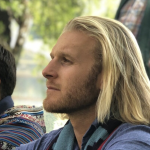 As a sought-after speaker, event facilitator and executive coach, Finnian has been dubbed “the Business Mystic” because of his unique ability to put consciousness into business and inspire leaders to find new levels of meaning and purpose through their creative endeavours. This approach flowed through his term as President of the Colorado Chapter of Entrepreneurs Organization (EO) – the largest and most influential community of entrepreneurs in the world. Finnian helps people ‘love their path’ so they can feel content with a life lived in the now.
As a sought-after speaker, event facilitator and executive coach, Finnian has been dubbed “the Business Mystic” because of his unique ability to put consciousness into business and inspire leaders to find new levels of meaning and purpose through their creative endeavours. This approach flowed through his term as President of the Colorado Chapter of Entrepreneurs Organization (EO) – the largest and most influential community of entrepreneurs in the world. Finnian helps people ‘love their path’ so they can feel content with a life lived in the now.
As an entrepreneur, Finnian built and exited two multi-million dollar companies in the financial industry. He’s the Creator and Chief Visionary Officer of Intentionality.com. Through the four paths of the Intentionality framework, Finnian guides people to be purposeful and aligned in their belief, thoughts and behaviors so they can feel more love in their life.
As a lifelong learner, Finnian has degrees in maths, physics, finance, leadership, teaching and a master’s degree of science in positive psychology. He spent 7 years in the Australian Defence Force and graduated from one of the most prestigious leadership organisations in the World, The Royal Military College of Duntroon.
Finnian makes appearances as a financial expert and is on a mission to bridge the gap between money and spirituality. He’s appeared on Sky Business, on ABC as a political commentator, and on Ten’s morning shows as a financial expert. He also regularly appears as a guest writer for online publications – Money Management, Smart Company, Business Insider, Forbes and more.
Finnian’s finest accomplishment to date was being featured on the popular National Geographic Documentary, Undercover Angel. This was a project where he was dropped into an underprivileged community to find out their core issues, build trust and come up with a project that would support their needs. He funded the entire program himself and worked with community leaders to form a family education center in Fakulteta, Bulgaria.
Above all, Finnian is a conscious being – committed to embodying Intentionality and inspiring others to do the same. Finnian travels the world spreading Intentionality on speaking tours, exploring new places and cultures and chasing powder as a ridiculously passionate skier!
For information on how to work with Don visit Work With Don Williams
You can also reach out to Don Williams at https://donwilliamsglobal.com
Please join Don and his businesses in support of St. Jude’s Children Research Hospital in its Mission to cure Childhood Cancers. You can donate to St. Jude at stjude.org/donate
